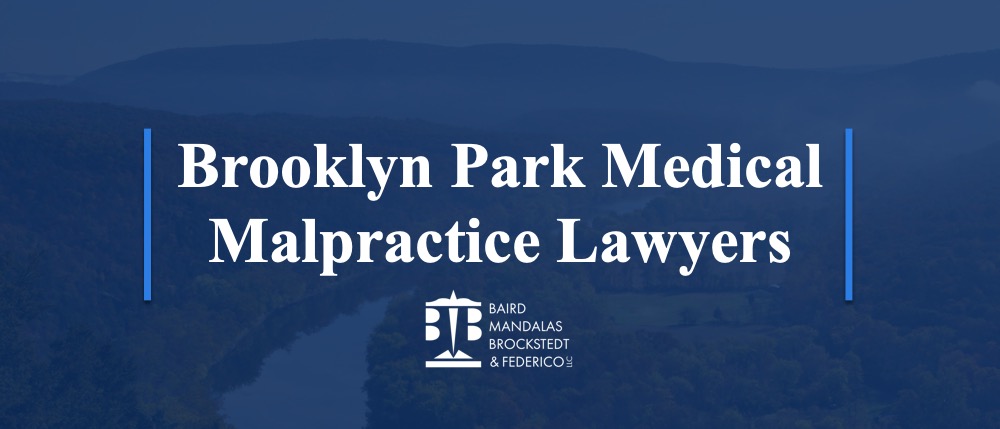
Negligent medical care can have devastating effects on a person’s life. If you suspect that you or a loved one have suffered injury as a result of medical negligence, you may qualify to seek compensation through a medical malpractice lawsuit.
Contact Brockstedt Mandalas Federico to schedule an appointment with a medical malpractice lawyer.
Medical Malpractice Claims in Maryland
Medical mistakes are called “adverse events” in Maryland. An adverse event is an unexpected occurrence related to an individual’s medical treatment and not related to the natural course of the patient’s illness or underlying disease condition.
The Hospital Patient Safety Program in Maryland describes three levels of adverse events:
- Level 1: an adverse event that results in death or serious disability;
- Level 2: an adverse event that requires a medical intervention to prevent death or serious disability; and
- Level 3: an adverse event that does not result in death or serious disability and does not require any medical intervention to prevent death or serious disability.
Maryland saw 769 Level 1 adverse events in 2022, a 52% increase from 2021.
How to Prove a Medical Malpractice Claim
Medical malpractice requires proof that a healthcare provider’s negligence worsened your injuries or prolonged your medical treatment. To prove a doctor’s negligence, you must show:
- You and the doctor had a doctor-patient relationship;
- This relationship imposed a duty on the doctor to comply with the standard of care accepted by similarly trained professionals;
- The doctor breached their duty by failing to act as a similarly trained doctor would act in similar circumstances;
- You suffered injuries because the doctor breached their duty of care; and
- You incurred damages from your injuries.
Maryland requires plaintiffs filing a medical malpractice claim to file a certificate from a qualified medical expert certifying their belief that the doctor breached their duty of care and the breach caused your injuries.
What Should I Do After a Medical Malpractice Injury
No one prepares to receive negligent treatment from a trained medical professional. Therefore, most people do not know what to do if they suspect that negligent medical care worsened or caused their injuries.
Our team prepared some steps you can take to preserve evidence for your attorney.
Do Not Make Statements to Insurance Representatives
After a medical malpractice injury, the doctor’s insurance company may reach out to you to settle your claim. You are not required to talk to the doctor’s insurance representatives.
They may use any statements you make about your injuries against you to minimize your potential settlement.
Additionally, do not feel pressured to accept any early settlement offers until you review it with a medical malpractice attorney.
When you hire a medical malpractice lawyer, you can tell the insurance company to contact us instead. We can review the settlement offer to determine if it fully compensates you for your losses.
Remember, you should avoid discussing your medical malpractice case on your social media profiles. The opposing party will keep tabs on your accounts and use any information you post to diminish your claim for compensation.
Request Copies of Your Medical Records
When you request a copy of your medical records from a medical care provider, they must provide them within 30 days. The medical records will contain valuable information an attorney can use to prove malpractice, including:
- The name of the doctor administering treatment,
- The doctor’s diagnosis,
- Description of tests the doctor ordered,
- A description of your symptoms,
- Names and dosage of prescribed medication, and
- The time of discharge.
If you contact a medical malpractice attorney, we can request the medical records on your behalf.
Gather Relevant Information About Your Case
You can also start compiling proof of the losses you suffered due to the doctor’s negligence. Relevant documents include things like invoices and medical bills associated with your worsened injuries.
If the doctor’s negligence caused a permanent disability, you can gather pay stubs and income tax records from before and after your injuries to prove your decrease in earning capacity.
Seek a Second Doctor’s Opinion
Your health is the primary concern if you suffer worsened medical issues due to negligent care or treatment. Instead of seeking further treatment from a negligent doctor, you should consult a new one for a second opinion.
You should disclose all the details of your prior treatment, including your initial symptoms, the diagnosis or treatment you received elsewhere, and the resulting complications or issues.
The new physician will likely need to run additional lab tests or review your medical records. If the new physician discovers a different issue or sees something the former doctor missed, it can strengthen your medical malpractice claim.
Practice Areas
Medical malpractice claims arise in several different situations. Below, our team has provided details about common types of medical malpractice cases.
Failure to Monitor
Medical staff must monitor patients closely to avoid unanticipated reactions and erratic vital signs. When a patient starts deteriorating, medical personnel must recognize it and respond quickly to prevent fatal consequences.
Between 10% and 13% of patient hospital deaths can be attributed to inaction or the lack of recognition of deterioration. This type of negligence may involve a failure to:
- Check a patient’s vital signs,
- Be fully aware of a patient’s medical history,
- Consult with appropriate specialists,
- Perform thorough evaluations,
- Order and evaluate appropriate lab tests,
- Evaluate surgical wounds for signs of infection,
- Monitor a patient’s reaction to anesthesia, or
- React to signs of distress.
Certain patients may need extra monitoring depending on the complexity of their diagnosis, the severity of their symptoms, or their risk of infection.
If a doctor or nurse’s failure to monitor a patient causes additional injuries or worsens existing ones, they may be liable for medical malpractice.
Communication Issues
Communication issues between doctors, nurses, surgeons, and other medical personnel can cause a patient to “slip through the cracks” and suffer medical complications as a result.
A study by the Journal of Patient Safety in 2022 found communication failures in 49% of the 50 medical malpractice cases it reviewed. Medical personnel must comply with guidelines regarding providing vital client information to the appropriate person.
Communication issues can also arise between the patient and their doctors and nurses. Distractions and other unforeseen problems in the hospital can make doctors mishear patients’ instructions or miss them entirely.
Failure to Diagnose
In most cases, early diagnosis of medical issues and illnesses can minimize your discomfort and limit the amount of your medical bills. Additionally, many injuries or medical conditions will worsen if a medical professional fails to diagnose you promptly and accurately.
Failing to diagnosis even a minor condition can lead to added medical costs and recovery time. Factors that can lead to a delayed diagnosis include:
- Failing to schedule follow-up visits with patients,
- Failing to schedule routine medical visits,
- Losing test results,
- Misinterpreting lab results, or
- Failing to refer a patient to the proper specialist.
If a medical professional fails to diagnose your condition or illness despite having sufficient information, you may qualify to file a medical malpractice claim.
Contact a Brooklyn Park Medical Malpractice Lawyer at Brockstedt Mandalas Federico
Our team at Brockstedt Mandalas Federico dedicates the majority of our practice to representing clients in medical malpractice claims.
We know what it takes to prove a medical professional’s negligence and recover compensation to reimburse you for your losses.
Contact a Brooklyn Park attorney at our office today to schedule a free consultation.
